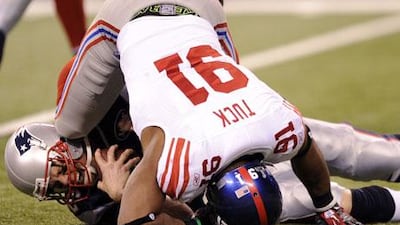INDIANAPOLIS // Tom Brady's two long incompletions in the final minutes, and several missed chances throughout the game cost the New England Patriots a chance at another Super Bowl victory.
It also resulted in their second Super Bowl loss to the New York Giants in four years, 21-17 on Sunday.
"We just came up a little bit short," Brady said. "There were some missed opportunities out there. It was a very hard-fought game. We fought till the end. I'm very proud of that."
With just over four minutes left, Brady tossed a pass to the left side to a wide-open Wes Welker near the Giants 20-yard line. But Brady's most reliable receiver – and the NFL leader with 122 catches – could not hang on.
After the game, Welker sat at a podium and stared straight ahead. His eyes were red. His hands were folded in his lap.
He blamed himself.
"It comes to the biggest moment of my life, and [I] don't come up with it," Welker said. "Most critical situation, and I let the team down."
Minutes later, the Giants marched for the go-ahead touchdown with 57 seconds remaining.
But Brady had one last chance. He threw a desperation pass half the length of the field into the end zone. Aaron Hernandez went up among three defenders, and the ball was tipped – out of reach of a lunging Rob Gronkowski as the ball fell to the ground and time ran out.
"I felt like I was close," Gronkowski said. "But close isn't there."
Added Brady: "We got to the 50, and ran out of time."
There were plenty more wasted chances by a normally disciplined team that prides itself on not making mistakes.
"I thought we played very competitive, had our moments where we moved the ball and stopped them," coach Bill Belichick said. "We were in the lead for a good part of the game. We just came up a couple of plays short."
The Patriots forced three fumbles, but the Giants kept the ball after each one.
"Those plays like that don't happen too often in a game and we didn't capitalise on the opportunities," wide receiver Deion Branch said.
The worst of those missed chances came when Brandon Spikes recovered a fumble by Victor Cruz with 4:14 left in the first quarter. But the Patriots were penalised for having 12 men on the field. That gave New York the ball at the New England 6.
Two plays later, Eli Manning hit Cruz for a 2-yard touchdown and a 9-0 lead.
Then Brady got hot, completing a Super Bowl-record 16 straight passes, and the Patriots surged to a 17-15 lead. They had a chance to make it a two-possession game when a mix-up on the Giants defence left Welker alone.
On a second-and-11 at the Patriots 44, the sure-handed receiver had a chance to score. All he had to do was catch the ball and, perhaps, make it to the end zone. Amazingly, the ball went off his hands.
"It's one of those plays I've made 1,000 times," he said.
But there were a lot more plays that cost the Patriots their fourth Super Bowl championship in 11 years.
"I think every guy in the locker room wishes they could have done a little more," Brady said.

